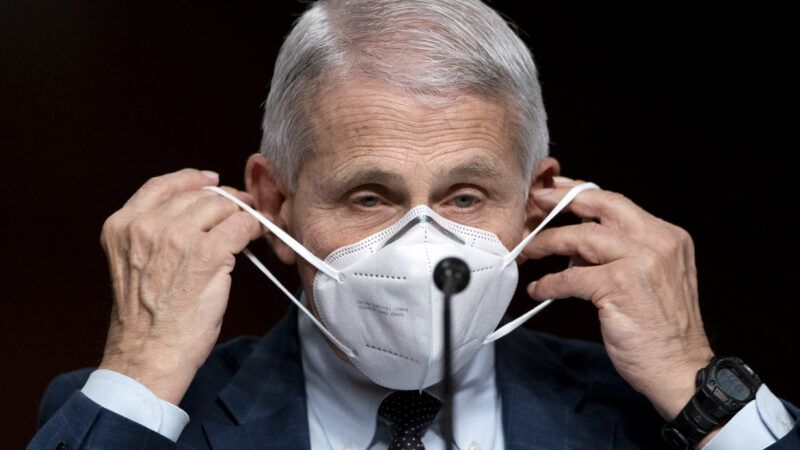Don't Make the Same COVID Mistakes Again
It's vital to recognize the many unforeseen consequences of school closures, business lockdowns, and mask mandates.

A recent AP fact-check article declared as "false" claims by "conspiracy theorists" that mask mandates and other COVID-era policies are coming back. "With COVID-19 hospitalizations steadily inching up in the U.S. since early July, some on social media are falsely claiming that federal employees were told that…pandemic-era restrictions will start returning this fall," it explained.
While there are few things I disdain more than conspiratorialists, one need not be given to complex theories about the Trilateral Commission and "dark-money" billionaires to recognize this possibility is not far-fetched. I've noticed people wearing masks again in airports. "Already, some U.S. schools and businesses have started bringing back mask mandates," NBC News reported last week.
I've watched enough major events unfold in my life to know the pattern. People spread some possible news prematurely, fail to get the details right—and then the media corrects them. Then, sure enough, something similar to what they predicted unfolds in coming months.
COVID cases are increasing again and the pandemic was a serious deal. We should—as individuals, businesses, and governments—learn the right lessons from the previous attempt to protect public health rather than repeat the past policies. That's obviously hard to do in a nation that's as polarized as ever.
Because of our system of federalism, we can try to compare the outcomes in states that enacted different policies. Our states vary so much in population size and density that it's hard to draw too many conclusions between, say, rural Wyoming and urban New Jersey, but a 2022 Wall Street Journal article focused on Florida, which re-opened quickly, and California, which imposed strict lockdown rules:
"The study ranks Florida 28th in mortality, in the middle off the pack and about the same as California, which ranks 27th…But Florida ranks third for the least education loss and 13th in economic performance. California ranks 47th overall because its shutdowns crushed the economy (40th) and in-person school (50th)," per the Journal's take on research from the National Bureau of Economic Research.
Subsequent data shows Florida with a higher death rate, but one more recent study argues that it compares favorably with California when adjusted by age and demographic information. Another study shows that Sweden, with its largely hands-off approach, fared better than other Scandinavian countries.
If you want your head to spin, however, you can find studies that conform to whatever your preconceived notions may be. A Politico study found that states with stringent lockdown rules suffered the lowest rate of deaths and hospitalizations, but the worst economic and educational results. But another study suggested that lockdown states also fared decently on the economic front, comparatively speaking. So much for trusting the "science."
Rather than fighting over the competing research, some of which no doubt is driven by ideological presuppositions, we should try to minimize every type of damage if another pandemic variant rears its ugly head. It's vital to recognize the many unforeseen consequences of the lockdowns themselves.
For instance, the federal National Institute for Mental Health found, tragically, that youth suicide rates rose significantly during the pandemic. Those rates also rose for adults, although by a lesser degree. Human beings are social creatures and locking us in our homes certainly takes its toll on our mental health.
In terms of education, California's school kids—especially poor and minority students—suffered grievous educational setbacks because of the stay-at-home orders. It didn't help that teachers' unions, who are focused on protecting the interest of school workers rather than students, fought efforts to re-open classroom learning. The state's private and charter schools did fairly well in adapting to distance learning—but the public schools, not so much.
"Two out of 3 California students did not meet state math standards and more than half did not meet English standards on state assessments taken in the spring, reflecting sizable drops in performance compared with the year before the pandemic," according to a Los Angeles Times report. "The test results are even more devastating for Black, Latino, low-income and other historically underserved students." Think of the long-term costs here.
It's harder to measure economic devastation, but anecdotally I see that most restaurants, bars, and businesses that I frequented before the shutdowns in downtown Sacramento are now permanently shuttered. The nation's absurd level of inflation is at least partially connected to the supply chain disruptions caused by the lockdowns (and the "free" stimulus dollars). Even some government agencies—note the recent $5.1-billion transit bailout—took a hit.
Then there's the toll on our freedoms. Just as the 9/11 terrorist attacks permanently changed our airline travel, the vast executive powers grabbed by governors have permanently eroded our property rights. At any time, and with little oversight, Gov. Gavin Newsom can become a czar and shut down your business or forbid the eviction of non-paying tenants. Our system of checks and balances is just one bad pandemic outbreak away from suspension. And all for healthcare results that, at best, up for debate.
No wonder so many Americans still have PTSD (Post Traumatic Stress Disorder) and assume the worst following every report of a COVID spike.
This column was first published in The Orange County Register.


Show Comments (121)